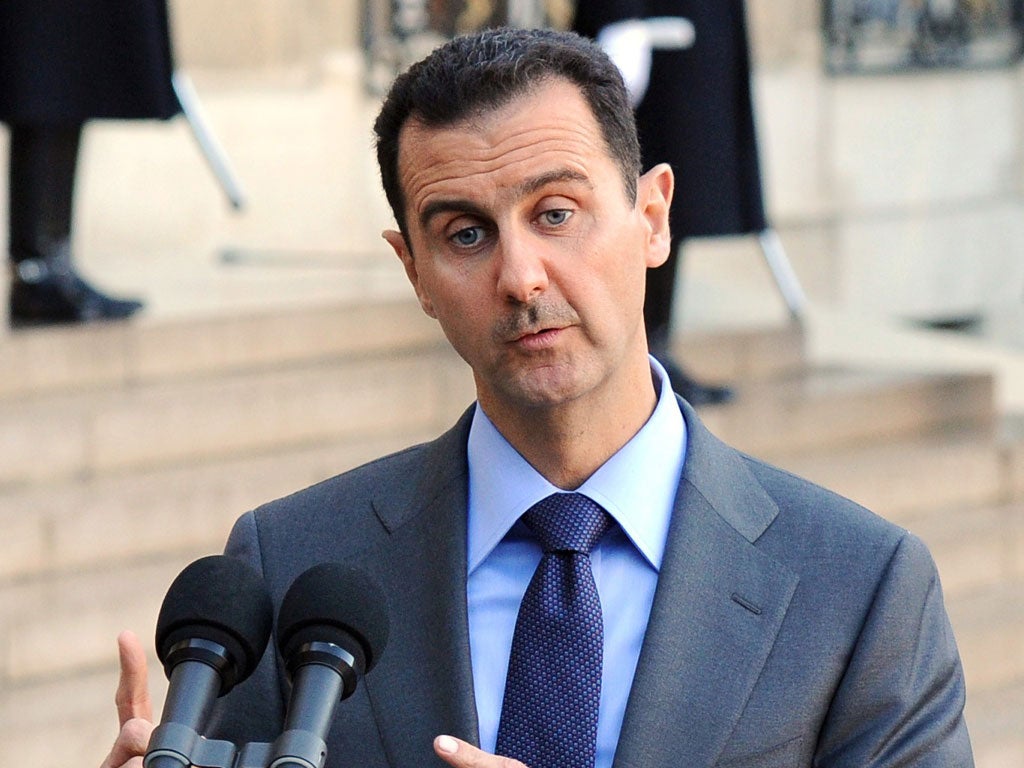Robert Fisk: Syria's newspapers trumpet an army victory but the sound of shellfire tells the true story
Sniper attacks prove that this war is far from over, writes Robert Fisk in Damascus


Your support helps us to tell the story
From reproductive rights to climate change to Big Tech, The Independent is on the ground when the story is developing. Whether it's investigating the financials of Elon Musk's pro-Trump PAC or producing our latest documentary, 'The A Word', which shines a light on the American women fighting for reproductive rights, we know how important it is to parse out the facts from the messaging.
At such a critical moment in US history, we need reporters on the ground. Your donation allows us to keep sending journalists to speak to both sides of the story.
The Independent is trusted by Americans across the entire political spectrum. And unlike many other quality news outlets, we choose not to lock Americans out of our reporting and analysis with paywalls. We believe quality journalism should be available to everyone, paid for by those who can afford it.
Your support makes all the difference.All night and all day, the guns of Kassioun have been firing. At Dayara and Kfar Souseh and Qadam and Nahr Aisha, proof that the enemies of Bashar al-Assad have re-entered the suburbs of Damascus after the government's recapture of the capital last month.
The long boulevard out to Kfar Souseh, a district of new middle-class apartment buildings and old slums – some of them wooden 150-year-old Ottoman homes whose narrow alleyways are a playground for the rebels of Syria – was deserted yesterday. Only the fresh white-painted sandbags of the soldiers and militiamen controlling the highway prove that the battle has returned to Damascus.
The artillery on the mountain that towers above the city has been firing into Deraya – government soldiers have been padding the alleyways of Kfar Souseh, to little effect – but the armed fighters tormenting the army appear to have performed their usual tactic: they have fled to fight another day. The papers continue to trumpet the army's victories, but the shellfire that reverberates across the city tells a different story: that the war is not over, that the security the government promised has not been restored.
Since the Syrian air force's attacks have been largely confined to the north, France's warning that it might consider a partial no-fly zone over Syria cuts little ice in Damascus. The "last battle" for the capital, boasted by the opposition, was definitely won by the army in July but the bankrupt policy of storming the city – a sign of the Free Syrian Army's naivety – has been succeeded by the hit-and-run sniper attacks that have already taken hold in Aleppo. In such a scenario, tanks are useless, shellfire the sound of impotence.
In war, there's always a stage when the rhetoric fails to match the reality. In Aleppo, where the government claims to be winning, the battles continue. In Damascus, which the government believes it holds, the sniping continues the moment you reach the city limits. "I never thought I would see Syria turn so bad," a Syrian Christian friend told me. "We have had this kind of magical formula in Syria, to maintain a balance between all the minorities. To play up this balance is to blow up Syria."
This is not an exclusive point of view in the capital. We were passing the Derwishya Mosque – yes, home of the Whirling Dervishes – and turning right by a Syrian church, and the restaurants were packed with Christians and Muslims, prices ensuring a middle-class clientele but the customers proof that the sectarian conflict of the Syrian countryside has no more reached Damascus than it has Aleppo.
I fear that I sometimes spot these differences in embryo – a memory of the Balkan wars, perhaps, or just those random remarks from friends about the determination of Sunnis to destroy the Alawites if Assad should fall – but they have not emerged in the big cities yet. Tartous is regarded as the safest city in Syria, Idlib the least, along with Homs. These are the realities – not the West's warnings – that Syrians live with. In the café in which I lunched yesterday, a visiting Russian imam was espousing the benefits of Islam in a secular society to his government hosts – what else would he do? – while my friend tried to explain why Assad could not be overthrown.
"Three million Alawites would be slaughtered – along with the Christians and the other minorities, it would be a bloodbath," he said. I have heard this before, of course, along with the usual praise for Syria's system of education and healthcare.
A drive around the Damascus ring-road shows how the war touches the city. Two security ministries attacked with car bombs last month have been surrounded by barbed wire and armed men. Police stations in the capital are now acquiring those 14ft protective concrete walls so familiar in Baghdad.
The car bomb is a weapon of war, alongside the aerial fighter-bomber, the sniper and the T-72. How do you win?
Join our commenting forum
Join thought-provoking conversations, follow other Independent readers and see their replies
Comments